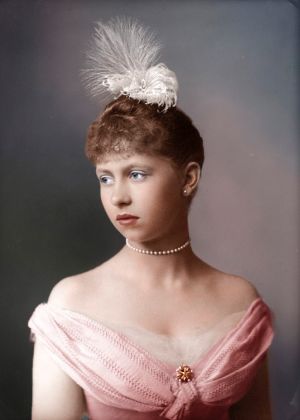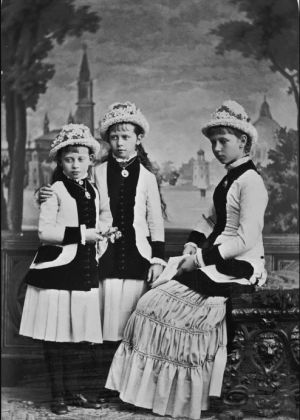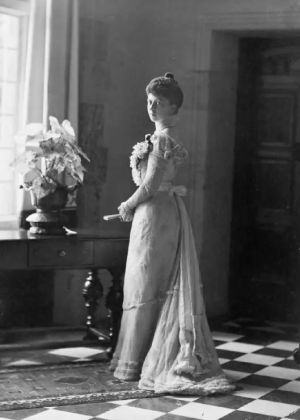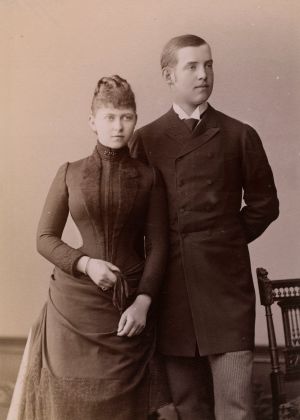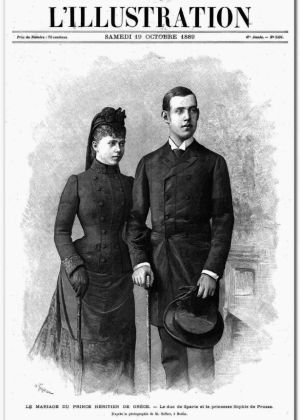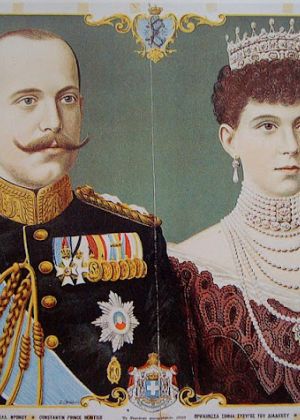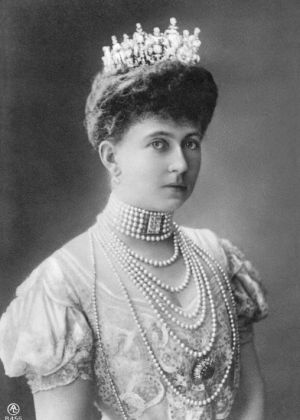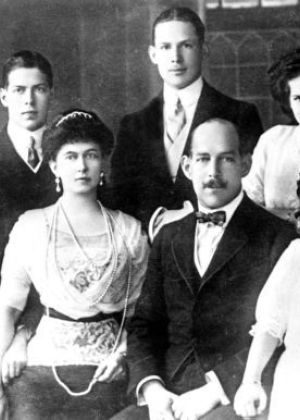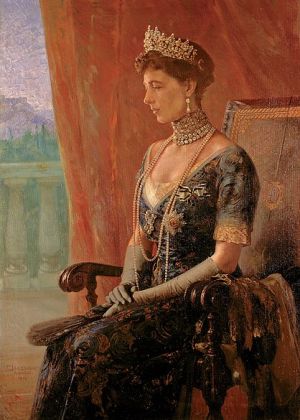Queen Sophia
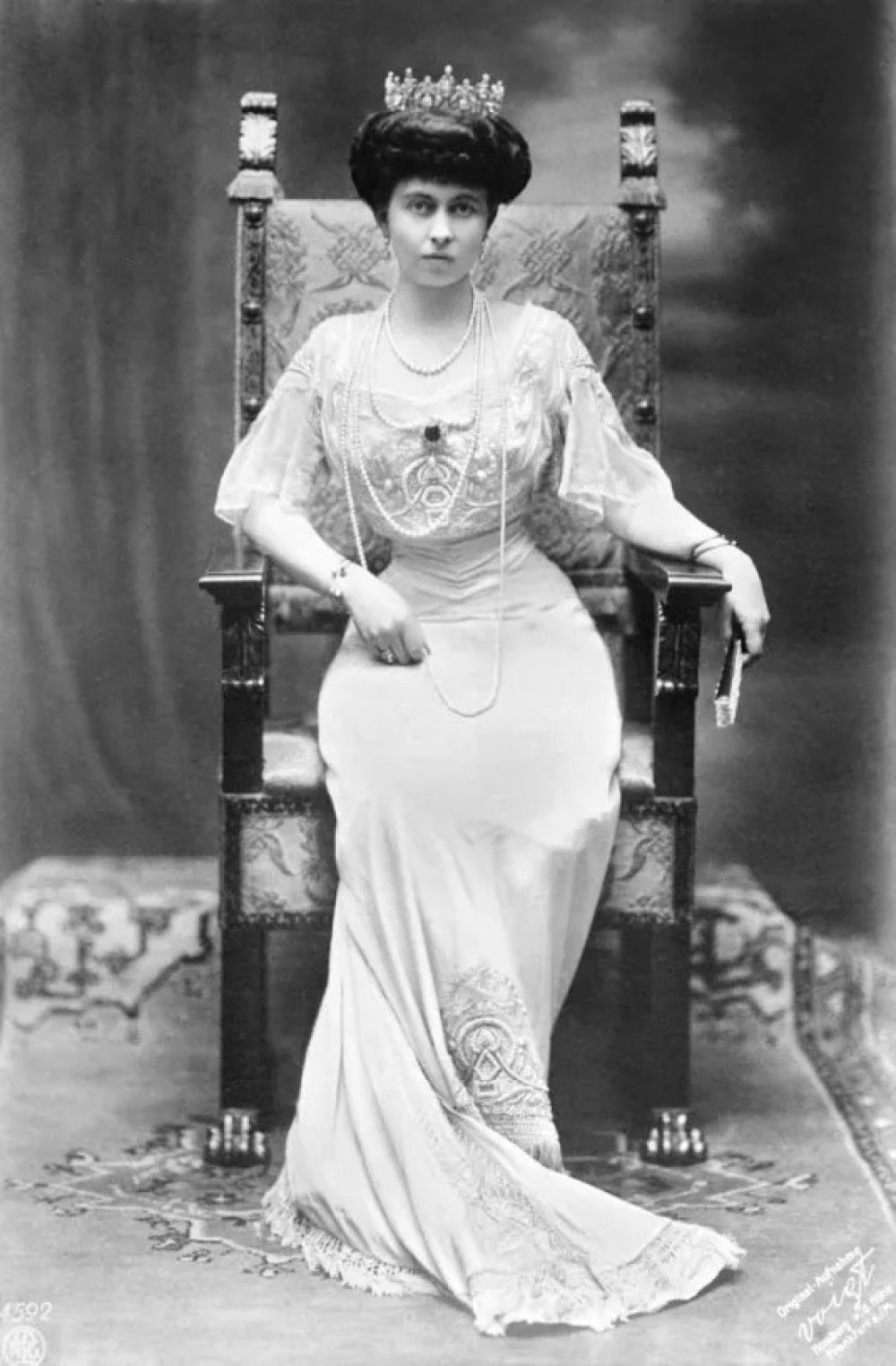
Looking back at the reign of Sophia and Konstantine I of Greece, placing the focus on the personality of Sophia herself, is undoubtedly worth the historian’s interest. The case of this royal couple is particularly interesting, since much has been written and even more has been recorded about it, in the public sphere debate.
They ascended the throne unexpectedly - though Konstantine was the rightful heir to the throne of course – following the horrendous murder of George I in 1913, in Thessaloniki. Their reign came in an intense, volatile and perturbated political environment hovering over Greek society and commenced with not the best of omens. Gunpowder was in the air of Europe and the Great War would soon erupt and drag all countries in a bloodshed. Nevertheless, the overall scenery did not tarnish the image of the young Queen. Following in the footsteps of her predecessor (Queen Olga), she tried, through her action and subtlety vis-à-vis her political role, to remain intact from the blows a big share of the Greek people caused to the royal court at large.
But let us take first things first.
Princess Sophie Dorothea Ulrike Alice of Prussia was a member of the House of Hohenzollern and was born in Potsdam, on 14 June 1870, at the eve of the Franco-Prussian war. She was the 5th child (amongst the surviving ones) of Frederick III (German Emperor and King of Prussia) and Victoria Princess Royal of the United Kingdom. She was born and raised in the royal palace of Potsdam, where she spent her childhood. She was educated in the realm of rigid formality and austere discipline of the German Court. Her biographer qualifies her as serious, intensely emotional, but of strong character. She had very solid education, as dictated by the etiquette pertaining to the children of the Court. Particular importance must be attributed to her acute perception and judgement and her appeal to letters. Living in the era of the pinnacle of late romanticism, there are also references of the romantic nature of the young girl, a common characteristic of all young ladies in Central Europe at the end of the 19th century, and of her love for poetry.
During the celebrations of Queen Victoria’s 50-year anniversary at the throne in 1887, in England, young Sophia will meet for the first time Prince Heir Konstantine – she was 17 and he was 19. That specific meeting was not the catalyst of their later relationship of course, but a mutual, more or less, platonic affection started blossoming. The relationship of the two young people will acquire solid foundations some years later, when the Prince Heir will come to Berlin in order to complete his military studies in the “Prussian War Academy” (Preußische Kriegsakademie). The time he remains in Germany he will be often invited to the German Court and the two youngsters will be given the opportunity to go beyond their original formal acquaintance and proceed into a more substantial relationship.
This relation seems to have the blessings of the German Court. It is actually recorded, as an anecdote, that Emperor Frederick, when he had visited Greece soon after the birth of the prince heir, had said to King George that the new-born boy would be married with one of his daughters; something which eventually did happen! Emperor was very fond of the Heir and the latter would pay him visits often, even in his last days before he passed away. Short before he died, actually, Emperor gave from his death bed his blessings for the engagement of the couple. It must be pointed out that this marriage served no political expediency and was not the fruit of any politico-economical agreement between the two Houses. The two young people met, fell in love and proceeded to tie the knot on their own volition, breaching the stereotypes of marriages in the aristocratic/royal circles. This may sound an extremely idealized interpretation of the facts, yet it does not seem to be too far away from reality.
On October 16, 1889, princess Sophia is wed to the Prince Heir Konstantine in Athens. Their wedding ceremony is a huge event for Greek society, since this is the first royal wedding taking place in the country; a wedding not merely of some royal family member but of the Prince Heir himself. The Greek people considered it a great honor, that their capital city was selected as the place where the wedding ceremony would be held; not the place of merely welcoming the newly-weds. Sophia had the desire to learn everything about her new land and get connected with the Greeks. She did not wish to be seen as an appointed princess (and future queen) and foreigner but be considered as one of them. She learned Greek even before coming to Greece, assimilated the morals and customs of her new homeland and studied, of course, the long history of this country, being strongly conscious of the fact that Greek history had affected her birthplace as well (echoing the strong romantic paradigms of the era).
An important event in the life of Sophia, which also affected her image to the Greek people, was her desire to convert from Protestant to Orthodox Christianity. She travels to Berlin in 1890 in order to announce her family, and especially her brother, Emperor William, her decision. Her family’s objections were fierce; indeed, this is considered the reason that caused her relations with her brother to turn cold, since Emperor William was a Fundamentalist Protestant and adamant vis-à-vis religious issues. Sophia’s decision on the matter was the fruit of elaborate thinking and sound argumentation. Her biographer stresses that it was not imposed on her, not even suggested to. She, herself, deemed proper to share everything with her husband and new homeland, including creed. She consequently wondered, how would it ever be possible to raise her children properly if they had different creed from her. These thoughts logically sound obsolete today, but let us not forget that we are still at the beginning of the 19th century and these issues had major impact on the royal (and not solely) affairs. On Holy Saturday (20 April / 2 May) 1891 Sophia was officially baptized and Archbishop Ghermanos II undertook to catechize her.
Sophia embarked upon her charity work very early in Greece. Perhaps she was influenced, to some extent, by her mother-in-law, Queen Olga, who was extremely active in this field. It could be sustained that a specific pattern is followed here, without implying, however, that this was a copycat attitude of Sophia, taken after Olga. It is manifestly the case of two women with strong personalities, goodness and kindness, who chose not to be mere political figures next to their husbands, but actually use their power in a different way, more social and charitable. It is interesting, for instance, to view her nature-loving action. It is recorded that, following her first excursion to the Philopappos Hill, she decided to organize, in cooperation with the then Athens Mayor Spyridon Merkouris, reforestations throughout the capital city. In the year 1900-1901 she is sworn in as honorary president of the “Philodassiki” [Forest-loving Society] commencing her action with the reforestation of the Philopappos Hill she so much grew fond of. Other important activities in the field of reforestation / tree-planting were at the foot of Lycabettus Hill, the creation of the Groves of Zappeion, Pagkrati and Kaessariane.
The Philanthropic Work of Queen Sophia
Her philanthropic work and big charities start already from the first years of her presence in the country.
Perhaps the most renowned and important one is the foundation of the children’s hospital “Aghia Sophia” in 1896, which is still in operation nowadays, at Ambelokepoe-Goude. This establishment greatly helped many poor children, at a time when child mortality was soaring and preoccupying and health measures were non-existent. Thus, following the incitation of the Princess, the hospital complex was erected and sufficiently equipped with both material and human resources. Special mention should be made to the “Great School of Nurses”, which was erected within the “Aghia Sophia” hospital complex, in response to the great need of the country for specialized health personnel. As she stated herself, while stressing her ultimate goal to serve the Greek people and being extremely sensible to children’s issues: “(…the hospital) must render the sick Greek children healthy and also educate Greek Nurses, worthy of their high destination”.
In the middle of an acute warfare, the charitable work of the princess – later queen (after her enthronement in 1913) – was focused on the hospital units, health and care of children (destitute and orphan ones) and battle casualties. Both during the unfortunate Greek-Turkish war and the Balkan Wars and the World War I, she organized many hospital units where she also used to offer her services, as recorded by photographic and testimonial archives. She also used to organize and provide funds for soup kitchens in Athens as well as Thessaloniki, Corfu and Philippiada.
In 1915 she founded her last establishment in Greece: the “Greek Women’s Patriotic League” [ alias Patriotic Foundation of Social Protection and Care «Π.Ι.Κ.Π.Α.»]. It was actually an association organized by herself and other Greek ladies in the service of Greek people devastated by war, in cooperation with the Red Cross and the Military Health Service. The Association offered medical care to destitute families, especially if the family heads were in the battle lines, as well as thorough training of the nursing personnel. Its mission also consisted in disseminating knowledge on basic hygiene rules in order to fight epidemics as well collecting clothing. Annexes of the League were established in district centers, all over the sovereignty, so as to implement all the above in remote areas, away from urban centers.
Sophia, as already mentioned, had the bad luck to arrive in Greece at highly sensitive and turbulent times. In 1897 Greece prepares for war, which will end in a humiliating defeat. A financial crisis ensued, very difficult to deal with and overcome. Less than a decade later, intense events, mostly turbulent and unpleasant, would succeed one another, putting the court at a very difficult spot: the assassination of King George I, Balkan Wars, National Schism (the Great Division), World War I.
The year 1913 will mark the royal family due to the unexpected assassination of King George I (March 5). The Prince Heir Konstantine and Princess Sophia are hastily proclaimed King and Queen of the Hellenes, on March 8, 1913, before Greek Parliament. Their future, however, would not be auspicious. The outbreak of World War I in July 1914 and the conflict between Eleftherios Venizelos and the Palace over the eventual entry of the country into war by the side of the Entente Coalition led to and fueled the national divide which had a devastating impact on the whole royal family and especially Sophia, who was overtly – due to her German origin – accused of influencing Konstantine against the Entente. At the height of the political crisis Konstantine was dethroned in 1917, the royal family was exiled from the country and their second-born son Alexander succeeded them to the throne. In 1920, Sophia’s son and now King Alexander dies unexpectedly of septicemia. Nevertheless, despite her sustained efforts, Sophia was not allowed to return to Greece so as to bid her son the final farewell. This shattered the mother’s heart. The royal family will be repatriated after the 1920 elections, but then again, the ensuing events will chase them to a second exile. The 1922 Asia Minor national tragedy and the Catastrophe of Smyrna [Izmir], which caused the death and displacement of thousands of Greeks born and living there is the darkest page of modern Greek History. The person accused by the heads of the movement (Coup led by Generals Plastiras and Kondylis) as main culprit for the destruction was King Konstantine, who abdicates the throne in favor of his son George II, on September 17. Thus, Sophia and Konstantine leave the country again, never to return.
Queen Sophia is characterized by many as the forgotten Queen of the Hellenes, due to the turbulent political events overshadowing her life and works in Greece. Her biographer and all those who covered the specific historic period do not portray Sophia in any dark hue overall. They insist on her significant charitable work, her pleasant and wise character, letting nevertheless some criticism pass through, mainly due to her descent and her husband’s decisions. There is no strong evidence, however, corroborating her direct influence on Konstantine’s political stance. Her German origin put her admittedly in a position very delicate and difficult to handle. She was, however, a kind-hearted woman with moral integrity, an excellent mother figure and extremely sensitive to her people that she assisted in every possible way whenever needed. Her works are still mentioned and no one can deny their positive impact.
Queen Sophia of the Hellenes passed away in Italy in 1932 and was buried in the crypt of the Russian Church in Florence, next to her husband Konstantine and her mother-in-law Olga (her relics were later transferred to and buried in Tatoi, in 1936).
One of the biggest and most important avenues in the center of Athens was named after her, bestowing her honor.
